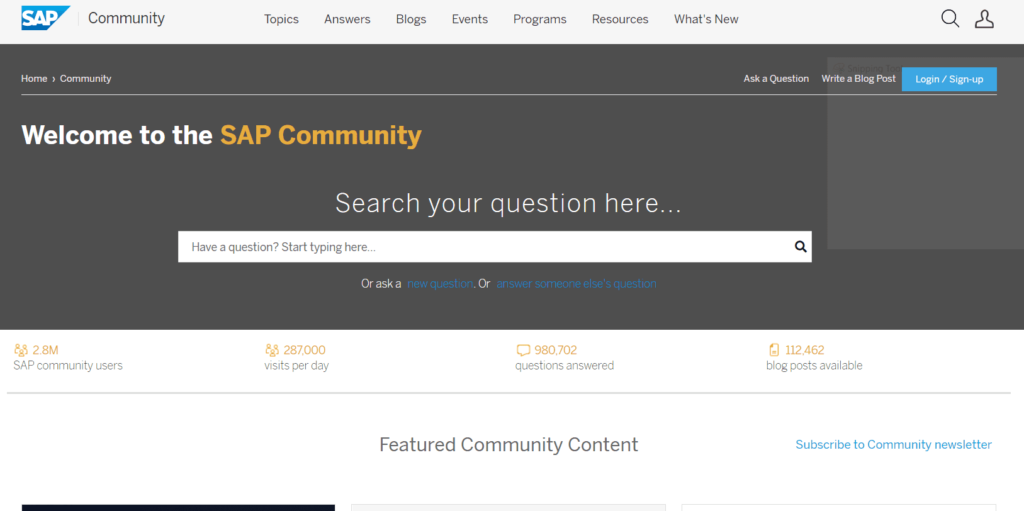There’s power in having an active brand community behind your business. Imagine an enthusiastic audience that not only knows about your business but also follows it avidly on its own. Picture a brand community that’s willing to share news and updates and to create self-driven discussions.
Sounds too good to be true?
It’s real, and it is something that great brands like Nike, Lego, and Playstation support as part of their marketing strategy. But it’s not just large businesses that can build a brand community.
Communities can revolve around small businesses and specific topics too. The SAP Community Network (SCN) is an example of a community based on a subject and a product: The SAP software. It has 2.8 million users, more than 980,000 questions answered, and over 112,000 blog posts.

The community members are an enthusiastic group that helps each other find solutions and learn more.
Building a brand community is essential for any business’s growth. Several benefits make it worthwhile and rewarding:
- You build a loyal customer base
- It supports repeat purchases and increases purchasing frequency
- It reduces marketing spend on advertising
- It improves brand memorability and creates brand awareness
- You enhance your reputation as a domain expert
- You can create a central hub for product or service related information
Building a brand community is a long term and ongoing marketing strategy. Your aim is to build a relationship between you and your customers, making your business a relatable entity in people’s minds.
So, how do you build a brand community?
Fortunately, creating your brand community is not difficult to do thanks to the tools available today, both free and paid. Let’s chart out how you can build an online brand that gives your business a firm footing in your domain.
Use Social Media
Using social media platforms is the easiest way to begin establishing your brand community. You probably already have social media pages and use them to share promotional messages.
But have you considered it as a community-building platform? Your social media pages can be a fertile ground to grow a brand community. It’s possible that you already have the start of a strong audience and now need to nurture it into an active information-hive.
You can develop your community by creating Facebook groups and LinkedIn groups. You can also launch a forum. It’s not necessary to name your groups after your brand. It might be better to identify your group as an interest or concern that your product relieves.
People are on social media to discuss ideas and engage with like-minded people. Use a clearly defined social media strategy to build a brand community. You’ll make use of a free platform for your audience to share information and find solutions.
You’ll drive traffic to your website, leading to conversions.
Create a membership site
To build a strong brand community, it is essential to have a well-crafted membership website. Check out this membership site guide from JoinIt that provides valuable insights and step-by-step instructions on how to create an engaging online platform for your community.
While social media sites and publicly available platforms are useful, they lack exclusivity. You can offer exclusivity and support with a membership site.
Creating a membership site offers a filtered space for discussions that are relevant and helpful. It serves as a hub for specialized information and increases your authority in your field.
Building a membership site is easy to do using a WordPress platform. All you need to do is add a membership site plugin and use it to manage content. Starting a membership site platform creates a user base that has access to exclusive information.
It allows users to find common threads and interests and brings people together over the shared experience of using your product. It can create a sense of belonging, greater receptivity to marketing emails from you, and a willingness to share your content.
Starting a membership site can take great effort, but the pay off is significant in the end. Once it gets momentum as more people sign up, it can also increase community numbers on its own.
Promote Your Membership Site
It’s essential to get people to sign up on your membership site to build a brand community. There are several compelling strategies that can convince your audience to join your membership site. Let’s look at ways you can make people aware of your online brand community.
Use Email Marketing and Newsletters
Email marketing is the most powerful conversion tool in digital marketing. Once you have it in place, you can use it to create content and direct people to join your online community. Let’s check out the other steps that you can use in conjunction with email marketing to build your brand community.
Offer Exclusive Content
Give people exclusive content that’s only available on your membership site. Offering discounts, trial periods, and other offers form some of the best incentives for most audiences.
You can couple such exclusive content with email marketing to drive traffic and convert people into members on your site.
Add Gamification
Gamification in marketing rewards users for doing something that helps meet your business goals. You can create a discount wheel popup which creates the experience of winning something. This can be a free ebook, a discount or some other offer that they can access by joining your site.
You can also reward users with points and badges to recognize user achievements. A great example of this is Sephora’s loyalty program that rewards its customers with redeemable points. Sephora also started Beauty Talk to create a community to discuss beauty-related topics.

Make Your Business Stand Out With a Brand Community
Developing your brand community takes consistent work and the right tools. You can bring people together by creating a space for them to get content and then discuss it.
Add useful non-promotional content that creates value for users. It’s also important to let them know that it’s there by promoting your social media platforms and membership site.
Your brand community reaps benefits over the long term. Focus on getting involved with customers and enabling communication. Businesses that aim to last don’t just get customers; they build relationships.


